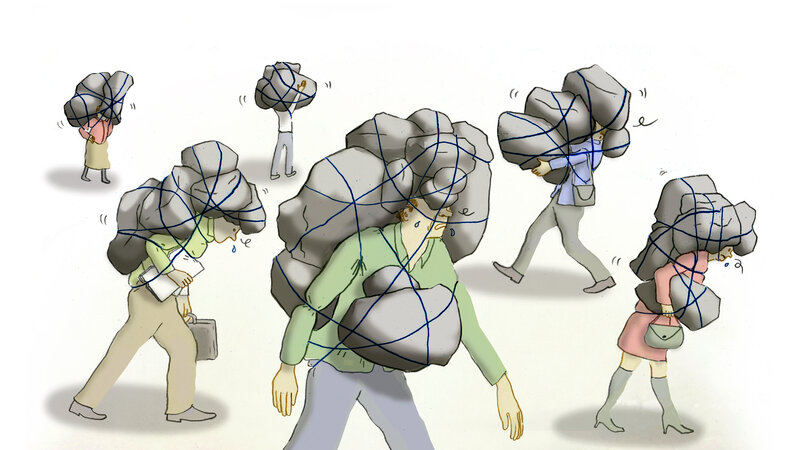Stress is the body's reaction to pressures from changes in life
situations with physical, mental, and emotional responses. Stress is a
normal part of life, an understood reaction to a stressful situation or
pressure. Not always easy to deal with. A medical health practitioner
gives some help to the readers of a parish bulletin on how to deal with
stress.
Stress and anxiety are not always easy to
distinguish. The words are often used interchangeably. Stress may be
positive but anxiety is always negative and long-lasting. Stress may
develop into anxiety. Both may be followed not only with headaches and
the raising of blood pressure but with depression and other
psychological problems. However, when we take extreme steps to avoid all
pressures we are not acting wisely for a certain amount of stress in
life is expected and not harmful and can be helpful. What we can do to
rid ourselves of the factors that produce the stress is all for the good
but some stress is not bad.
Stress factors make life
difficult. However, often the secondary responses to the stress are what
makes the problem troublesome. An example: "Why does this happen to
me?" "Why did I act so foolishly?" and blaming oneself. Trying to
solve the problem by drinking and other harmful acts are to be avoided.
It may be difficult to prevent stress but we can prevent the secondary
acts that follow upon the stress.
Psychological capital
refers to what we have within ourselves to deal with adversities. It's a
positive evaluation and perception of our abilities. The ability to
bounce back after a fall, resilience to recover from failure, motivation facing negative events, optimism that accepts positive events
internally and persistently. It's necessary to find and cultivate such
inner psychological resources. When all our efforts at overcoming the
stress encountered are of no help we need to ask for help.
These
days in the liturgical year we are hearing of the mysteries of our
faith which in a word deal with the love God has for his creation. God
is love and this is repeated in the liturgy. Faith is a belief in this
love and the desire to accept it. However, the noise we have to contend
with in our world drowns out a great deal of the messages. Below are the
words of St. Francis de Sales on anxiety which we can understand as a
type of stress and more serious.
Anxiety is the greatest evil
which can happen to the soul, sin only excepted. Just as internal
commotions and seditions ruin a commonwealth, and make it incapable of
resisting its foreign enemies, so if our heart be disturbed and anxious,
it loses power to retain such graces as it has, as well as strength to
resist the temptations of the Evil One, who is all the more ready to
fish (according to an old proverb) in troubled waters.
Anxiety
arises from an unregulated desire to be delivered from any pressing
evil, or to obtain some hoped-for good. Nevertheless, nothing tends so
greatly to enhance the one or retard the other as over-eagerness and
anxiety. Birds that are captured in nets and snares become inextricably
entangled therein, because they flutter and struggle so much.
Therefore,
whensoever you urgently desire to be delivered from any evil, or to
attain some good thing, strive above all else to keep a calm, restful
spirit,--steady your judgment and will, and then go quietly and easily
after your object, taking all fitting means to attain thereto. By easily
I do not mean carelessly, but without eagerness, disquietude or
anxiety; otherwise, so far from bringing about what you wish, you will
hinder it, and add more and more to your perplexities (Introduction To A
Devout Life by St. Francis de Sales).
